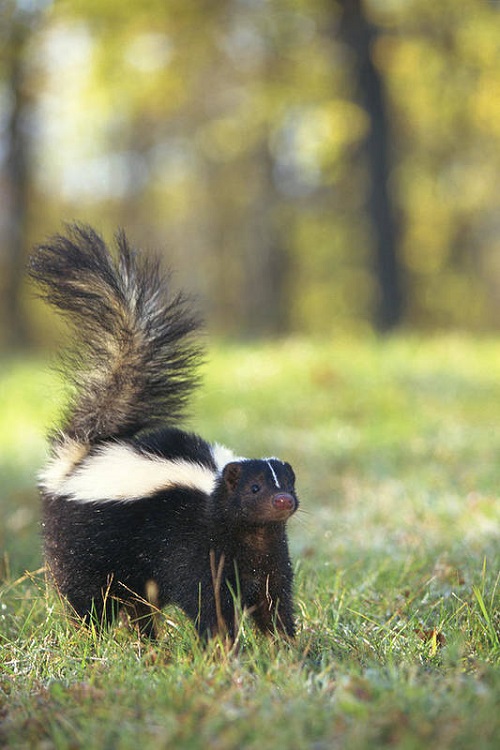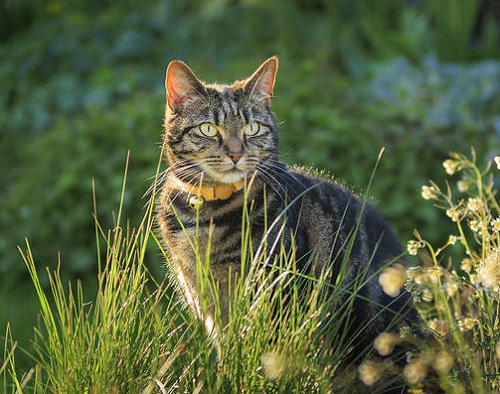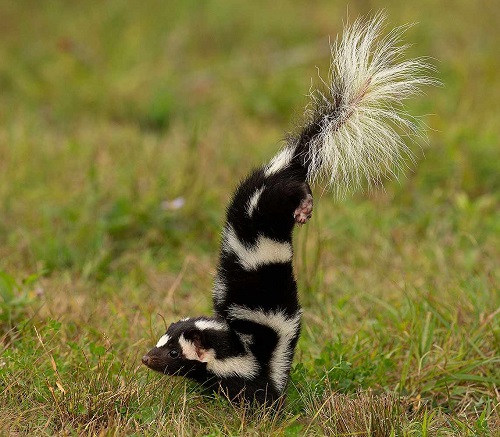Do Skunks Kill Cats? Discover whether skunks can pose a lethal threat to felines in this comprehensive guide.
Skunks are a familiar sight in many suburban and rural areas, known for their distinctive coloring and unforgettable odor. But for households with pets, particularly kitties, a question always arises, Do Skunks Kill Cats? Read on to learn the answer.
Find out Can Cats Eat Moles here
What is a Skunk?

With their distinctive black and white fur, skunks are known for their ability to release a strong-smelling spray as a defense mechanism. They are native to North and South America and belong to the family Mephitidae. Skunks have a compact body with short legs and a bushy tail. They are primarily nocturnal creatures and are omnivorous, feeding on a variety of foods such as insects, small mammals, birds, eggs, fruits, and vegetation. While skunks are generally non-aggressive, when threatened or startled, they can emit a pungent spray from glands located near their anus to deter predators.
Do Skunks Kill Cats?

Skunks are generally not aggressive towards cats and typically avoid confrontation if possible. They primarily have an interest in foraging for food. However, in rare cases, a skunk exhibits defensive behavior and sprays when provoked by a feline. Skunks are more likely to retreat or spray as a means of self-defense rather than killing a kitty.
Note – Make sure to minimize your cat’s interactions with wildlife, including skunks, to avoid mishaps.
Can Skunk Spray Kill a Cat?
Skunk spray itself is unlikely to kill a feline. However, it can cause temporary discomfort, irritation, and potential health issues if the spray gets into the cat’s eyes, nose, or mouth. The strong odor and chemicals in skunk spray can lead to respiratory distress, vomiting, or other adverse reactions in kitties. While skunk spray is not typically lethal, address the situation by consulting a vet to ensure the cat’s well-being and minimize any potential complications.
About the Skunk’s Spray
Skunk spray is a powerful defensive mechanism that keeps predators away and gives the skunk a chance to escape from harm. It’s a potent combination of chemicals, primarily sulfur compounds called thiols. When a skunk releases the spray, it emits a strong and highly offensive odor that people can detect from a considerable distance. The spray is capable of causing temporary discomfort and irritation in humans and animals upon contact. Its smell can linger for days and is notoriously difficult to remove.
Do Cats Kill Skunks?
Cats are natural predators, and in some cases, they can attempt to hunt and kill skunks. However, skunks possess effective defense mechanisms, such as their strong-smelling spray, which they can use to deter and ward off potential predators. Skunks have sharp claws and can deliver a painful bite when needed. While some felines can successfully capture and kill skunks, there is a risk of injury or getting sprayed in the process. Generally, experts recommend keeping cats away from skunks to prevent potential conflicts.
What to Do If My Cat is Sprayed By a Skunk?

If a skunk sprays your cat, take the below steps:
- Keep your distance: Approach your cat calmly and avoid getting too close initially, as the skunk’s spray is extremely pungent and can cause discomfort.
- Wear protective gear: Put on gloves, old clothing, and eye protection before handling your kitty to prevent the spread of the skunk odor to yourself.
- Confine your cat: Move your kitty to a contained area to prevent it from spreading the skunk spray throughout your home.
- Ventilate the area: Open windows and doors to allow fresh air to circulate and help dissipate the smell.
- Check for injuries: Inspect your cat for any signs of injury, particularly in the eyes, nose, or mouth. If there are any visible injuries or if your feline appears distressed, contact a vet immediately.
- Isolate affected items: Remove any clothing, bedding, or items that came into contact with the skunk spray and seal them in a plastic bag until you can properly clean them.
- Decontaminate your cat: To neutralize the skunk odor, you can bathe your cat using a special skunk odor removal solution. Follow the instructions carefully and avoid getting the solution in your cat’s eyes or ears. Also, rinse your cat thoroughly with warm water after bathing.
- Seek veterinary advice: If your cat continues to exhibit signs of discomfort or you have any concerns, consult your vet for further guidance.
Remember, take precautions to avoid encounters between your cat and skunks in the first place to prevent potential spraying incidents.
Do Skunks Kill Cats? Quick Takeaways!
- A skunk is a small mammal known for its distinctive black and white fur.
- The skunk’s spray is a powerful defensive mechanism that the skunk uses when it feels threatened.
- Skunks are generally not aggressive towards felines and typically avoid confrontation if possible.
- Skunk spray itself is unlikely to kill a cat. However, it can cause temporary discomfort, irritation, and potential health issues to felines.
- Cats are natural predators, and in some cases, they may attempt to hunt and kill skunks.



